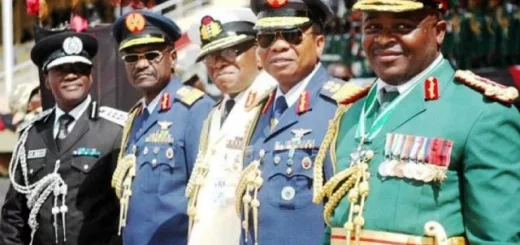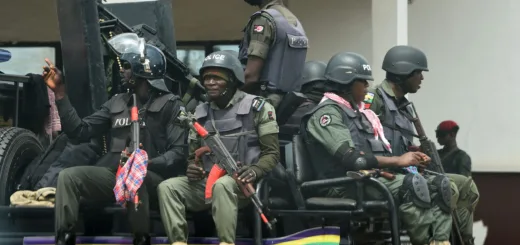Top Major Government Security Agencies in Nigeria & Functions
Crime and security has always been a major concern in virtually all the countries in the world. The government is always on the lookout for criminals who destabilize the peace and order in the society. Nigeria is not an exception. The federal, state and local government have devised means of curbing crime.

Major National Security Agencies in Nigeria
No wonder, lots of resources have been sunk into fighting crime and this is not likely to end anytime soon due to the unrepentant nature of the citizenry. In Nigeria, many security agencies have been instituted and passed into law. They have been given the mandate to enforce the laws, fight different forms of crime and prosecute defaulters.
Top Major Government Security Agencies in Nigeria Roles & Functions
Sequel to this, we shall now highlight the different government-owned security agencies in the country and their core responsibilities/functions.
The National Drug Law Enforcement Agency (NDLEA)
NDLEA is the first example of security agency in Nigeria that functions as a regulatory body set aside to control illicit drugs in the country. Their duty is to track down the selling and exporting of hard drugs. They can be found in places such as the Airport, highways, sea ports, borders, etc.
These guys are always on the lookout for cannabis and other hard drugs farms to destroy. Their main targets are the leaders and users of these hard drugs. NDLEA was established in 1990 by Decree number 48 of the federal republic of Nigeria.
The State Security Service (SSS)
The State Security Service (SSS), also known as the Department of State Services (DSS) is the primary domestic intelligence agency of Nigeria. Its primary function is intelligence gathering within the country and protecting senior government officials such as the President and state governors.
As the basic domestic intelligence agency of Nigeria, the State Security Service was creaated when the National Security Organization was dissolved in 1986.
It was formerly called the National Security Organization (NSO). Today, the SSS operates as a department within the presidency and is under the control of the National Security Adviser.
The SSS also has the power to investigate evolving security threats in Nigeria involving counter-terrorism and counter-insurgent attacks.
The primary roles of the State Security Service are:
- To defend and protect the nation against external domestic threats
- To enforce the criminal laws of the land.
- To provide the necessary services that promulgates criminal justice at both federal and state law-enforcement level.
- To protect and secure Government officials from the President, Vice President, Senate President, Speaker of the House of Representatives, State Governors and their immediate families.
- To protect other high ranking officials in government such as past presidents, certain candidates for the offices of President and Vice President, and visiting foreign heads of state and government
The Nigeria Customs Service (NCS)
The Nigeria Customs service has a primary duty of tackling anti-smuggling activities within the borders of the country. They are in-charge of collecting and accounting for import/export duty revenues at the borders.
They check mate the smuggling of toxic and hazardous substances, money laundering, guns and weapons at the borders. They are a very important element for the implementation of Government policies.
The Nigeria Federal Road Safety Commission (FRSC)
The FRSC is a paramilitary organization in the country saddled with the responsibility of ensuring that the federal roads are safe for motorists. The commission was established through Decree No. 45 of the 1988 constitution.
This commission is mandated to check mate the users, educate them, assign speed limits, and ensure that they adhere to the rules and regulations of the road.
In a nut shell, their duties are channeled towards reducing the rate of road accidents on our federal roads. They arrest and prosecute road users that commit traffic offenses.
The Nigeria Immigration Service (NIS)
The Nigerian immigration service has a sole responsibility of coordinating the migration activities in the country. They control the entrance of people into the country and they offer residence permits to foreigners.
They check mate and prosecute foreigners that made illegal entrance into tho country. If you are a foreigner without your travel papers, then know that these guys will be on your trail.
For Nigerians seeking to travel out of or into the country, NIS, are in-charge of issuing travel documents, visa, international and regional passports. NIS was carved out from the Nigerian police force in 1958. In a nutshell, the NIS is mandated to undertake border surveillance and control and migration management.
The Nigeria Security and Civil Defense (NSCDC)
NSCDC has the mandate to maintain peace and order and to safe the civil society during period of emergency such as war and terrorism. They protect t lives and property, they check mate vandalism of facilities owned by government such as power holding company of Nigeria (PHCN) electric wire cables, oil rigs, engines, etc.
This security outfit sensitize and educate the civil society on some security measures to be taken in time of war and civil unrest. They first swung into action during the civil war in may 1967 when they rescued and protected the lives of civilians in Lagos, the then federal capital territory.
NSCDC had since then been given the right to arrest and prosecute members of the society suspected to deal in oil bunkering, vandalism and burglary of government-owned property and projects.
The Nigerian Police Force (NPF)
The Nigerian police is saddled with the responsibility of maintaining law and order in the society. They ensure that the laws of the government are implemented and defaulters arrested and prosecuted. A lot of persons call them “men in black”.
They patrol in cases of burglary or armed robbery attacks. They are part of national securities that investigates and ensure that criminals are clamped down. Officers of the Nigerian police are usually deployed as security in banks and other government agencies.
They also perform some military duties mostly during the period of civil unrest and war when they are sent for peace keeping in affected areas. They are also attached as security aids to top government officials, politicians and expatriates.
The National Intelligence Agency (NIA)
The National Intelligence Agency (NIA) is another Nigerian government security agency saddled with the responsibility of overseeing foreign intelligence and counterintelligence operations.
The NIA was established after the National Security Organization (NSO) was dissolved. This agency operates separately from the State Security Service (SSS) . Under the Office of the Co-ordinator of National Security is the State Security Service (SSS), NIA and the Defence Intelligence Agency (DIA) who are majorly responsible for military intelligence.
It is to noted that recruitment into the NIA isn’t made public but staff of this agency are highly trained and effectively skilled with classified intelligence that are mostly discreet.
The primary functions and roles of the NIA are almost similar to other foreign security intelligence outfits such as:
- Secret Intelligence Service of the United Kingdom’s (known as the SIS or MI6),
- The Central Intelligence Agency (CIA) of the United States of America
- The Australian Secret Intelligence Service (ASIS)
- The Canadian Security Intelligence Service (CSIS)
- KGB of Russia
- Israel’s Mossad
The Defence Intelligence Agency (DIA)
The Defence Intelligence Agency (DIA) operates as the country’s military intelligence agency. Founded in 1986, the Defence Intelligence Agency is responsible for providing the necessary means of obtaining military intelligence on behalf of the Ministry of Defence and the Nigerian Armed Forces.
The person in charge who doubles as the head of the DIA is the Chief of Defence Intelligence (CDI), He is appointed by the President of the country.
The primary functions of the DIA include:
- To ensure that Nigeria’s Defence Policy is promoted
- To facilitate military cooperation with other foreign countries
- To offer information and strategies to ensure the protection of the lives of Nigerian citizens
- To also maintain the territorial integrity of Nigeria’s boundaries.
The Nigerian Armed Forces
The Nigerian Armed Forces includes all security outfits that are armed in the country. Most people limit the armed forces to the Police, Nigerian military (Army, Navy, and the Nigerian Air force). This shouldn’t be so as there are other agencies in Nigeria that are armed also.
-
The Nigerian Army
The Nigerian Army (NA) are the ground or better still, the land division of the Nigerian Armed Forces. They have the highest population and operate based on order, discipline and hierarchy
-
The Nigerian Navy
The Nigerian Navy (NN) has its headquarters in Abuja and are the sea branch of the Nigerian Armed Forces, protecting the country’s territorial waters. Its three operational commands are in Lagos, Calabar, and Bayelsa.
-
The Nigerian Air Force
The Nigerian Air force operates on the air but also provides support for both the Army and Navy.
The primary roles of the Nigerian Military include:
- To maintain the territorial integrity of Nigeria by defending the nation from external aggression both on land, sea or air
- To also aid other security and paramilitary outfits in tackling internal threats. This is subject to the command of the President as approved by the National Assembly.
- To carry out other functions assigned to it by Federal Republic of Nigeria.
Wrapping Up
It is an incontrovertible fact that there is no society devoid of crime, this is because people engage in different forms of criminal activities daily. There is always the need for lives and properties of innocent members of the society to be protected, hence the need for security. The aforementioned National security agencies have over the years been working round the clock to ensure that Nigeria is safe for her citizens.
Are these agencies allowed to possess guns and fire-arms?
In an online report, the President recently signed into law with executive powers to remove, revoke, banish all firearm or shotgun certificate or license in Nigeria
This executive order will start from 1st March 2023. Nobody in the country is now allowed or authorised to own or carry prohibited weapons or gun.
If you think you have any license issued to you in the past / previously allowing you to own or carry any type of gun, prohibited weapons, components parts and prohibited ammunition or selling; that license is now dead.
Only legit police officers and the army that is fully authorised can carry a gun.
All Civil Defense Corps and other security organisation are no longer allowed to carry weapons from 1st March 2023.
You must: now hand in back all type of firearm license or certificate issued to you in the past to the nearest police headquarter in your state.
Please do not hand-in your old certificate / license in a police station. It must be handed at the police headquarters.

